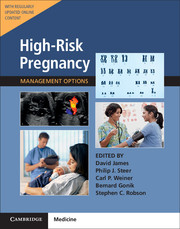Book contents
- Frontmatter
- Contents
- List of Contributors
- Preface
- Section 1 Prepregnancy Problems
- Section 2 Early Prenatal Problems
- Section 3 Late Prenatal – Fetal Problems
- Section 4 Problems Associated with Infection
- Section 5 Late Pregnancy – Maternal Problems
- 30 Substance Misuse in Pregnancy
- 31 Medication in Pregnancy
- 32 Hypertension in Pregnancy
- 33 Cardiac Disease in Pregnancy
- 34 Respiratory Disease in Pregnancy
- 35 Anemia and White Blood Cell Disorders in Pregnancy
- 36 Hematological Malignancies in Pregnancy
- 37 Thrombocytopenia and Bleeding Disorders in Pregnancy
- 38 Disorders of Coagulation in Pregnancy
- 39 Autoimmune Disease in Pregnancy
- 40 Diabetes in Pregnancy
- 41 Thyroid Disease in Pregnancy
- 42 Pituitary and Adrenal Disease in Pregnancy
- 43 Gastrointestinal and Liver Diseases in Pregnancy
- 44 Neurologic Complications in Pregnancy
- 45 Renal Disorders in Pregnancy
- 46 Spine and Joint Disorders in Pregnancy
- 47 Skin Disease in Pregnancy
- 48 Malignant Disease in Pregnancy
- 49 Pregnancy After Transplantation
- 50 Trauma in Pregnancy
- 51 Mental Health Disorders in Pregnancy
- Section 6 Late Prenatal – Obstetric Problems
- Section 7 Postnatal Problems
- Section 8 Normal Values
- Index
30 - Substance Misuse in Pregnancy
from Section 5 - Late Pregnancy – Maternal Problems
- Frontmatter
- Contents
- List of Contributors
- Preface
- Section 1 Prepregnancy Problems
- Section 2 Early Prenatal Problems
- Section 3 Late Prenatal – Fetal Problems
- Section 4 Problems Associated with Infection
- Section 5 Late Pregnancy – Maternal Problems
- 30 Substance Misuse in Pregnancy
- 31 Medication in Pregnancy
- 32 Hypertension in Pregnancy
- 33 Cardiac Disease in Pregnancy
- 34 Respiratory Disease in Pregnancy
- 35 Anemia and White Blood Cell Disorders in Pregnancy
- 36 Hematological Malignancies in Pregnancy
- 37 Thrombocytopenia and Bleeding Disorders in Pregnancy
- 38 Disorders of Coagulation in Pregnancy
- 39 Autoimmune Disease in Pregnancy
- 40 Diabetes in Pregnancy
- 41 Thyroid Disease in Pregnancy
- 42 Pituitary and Adrenal Disease in Pregnancy
- 43 Gastrointestinal and Liver Diseases in Pregnancy
- 44 Neurologic Complications in Pregnancy
- 45 Renal Disorders in Pregnancy
- 46 Spine and Joint Disorders in Pregnancy
- 47 Skin Disease in Pregnancy
- 48 Malignant Disease in Pregnancy
- 49 Pregnancy After Transplantation
- 50 Trauma in Pregnancy
- 51 Mental Health Disorders in Pregnancy
- Section 6 Late Prenatal – Obstetric Problems
- Section 7 Postnatal Problems
- Section 8 Normal Values
- Index
Summary
Introduction
Imagine asking yourself the question, “How would I describe a typical pregnant woman who uses drugs?” You might reply that she comes from a different social class, cannot think beyond the pregnancy, uses jargon, and doesn't listen or care about the welfare of the child. However, my experience when asking drugusing women what they thought about the typical obstetrician is that they say the doctor was from a different social class, could not think beyond the pregnancy, used jargon, and didn't listen or care about the welfare of the child.
There are many barriers to delivering effective care to women who misuse substances. Seeing the situation from their point of view is always a good start.
Substance Misuse: General
Lifestyle
Much of the harm caused by illicit substances is indirect, linked to the associated lifestyle needed to fund drug use and the inherent risks of administration. Many of the risks are greater for women than for men. Women are more likely to use prescribed psychoactive medication, have less capacity to metabolize the drug (such as alcohol), hide their use for fear of stigmatization, and hence increase their vulnerability to victimization. As many as two-thirds will have a concurrent mental health problem, and even if such problems do not currently exist their susceptibility to depression, suicidal ideation, and post-traumatic symptoms as a result of victimization is much greater.
Eventually the lifestyle revolves around the drugs, risk-taking increases, and there is self-neglect and social isolation. As tolerance of illicit drugs develops, the intravenous route becomes more attractive despite the risks of bloodborne viruses, abscess formation, septicemia, endocarditis, vascular insufficiency, deep venous thrombosis, and thromboembolism.
Identification of Substance Misuse
There is no shortcut nor any single stereotype to recognize. The only method that seems to be useful in most cases is to ask the woman, and to ask again later in the pregnancy. While some women may be offended at this line of questioning, if it is presented as routine it may be more acceptable. It is important not to be offended if it turns out the woman lies: it is understandable, for disclosure is a huge step and can take time.
- Type
- Chapter
- Information
- High-Risk Pregnancy: Management OptionsFive-Year Institutional Subscription with Online Updates, pp. 779 - 807Publisher: Cambridge University PressFirst published in: 2017



